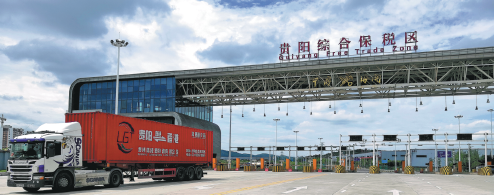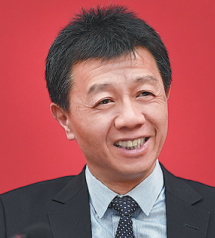'Engine' of economy at full tilt in Guiyang

A truck destined for a regular direct journey between Guiyang and Hong Kong pulls out of the Guiyang Free Trade Zone. [Photo/CHINA DAILY]
City's opening-up and landmark free trade zone taking the lead role in Guizhou province's growing role in cross-border e-commerce
The Guiyang Free Trade Zone is making strides in developing cross-border e-commerce and forging itself into a crucial area for opening-up, as the city in Southwest China's Guizhou province promotes its high-quality economic development.
"Guiyang will use the construction of an inland open economic pilot zone as the lead and make every effort to improve the level of opening-up," said Chen Yan, mayor of Guiyang, on May 13. He was speaking at the opening of the fifth session of the 14th people's congress of Guiyang.

Chen Yan, mayor of Guiyang
Working as an "engine" of the city's open economy, the Guiyang Free Trade Zone is the first comprehensive bonded zone in Guizhou province.
Focused on developing cross-border e-commerce, improving the business environment and opening-up, the free trade zone is developing into a bonded zone with a high-level of opening-up and a raft of preferential policies, according to the local government.
Under the technical support provided by technology giant Alibaba's cross-border e-commerce service center in Guizhou, the Guiyang Free Trade Zone launched an integrated service website in September 2019.
The website aims to help foreign trade companies explore international markets by offering quality services, including training for professionals, business tracking and supply chain development.
"Some trading companies that act as agents to sell tires and wheel hubs could only facilitate traditional domestic sales in the past, since they are lacking in foreign trade professionals and knew little about cross-border e-commerce business," said Chen Longgang, director of operations and services with the Alibaba's e-commerce service center in Guizhou.
But this situation has been turned around. Taking advantage of the cross-border business service website, local companies have reached agreements with overseas traders from nine countries, Chen added.
Up to now, a total of 147 companies have registered on the website and are able to find more services and businesses.
In addition, the Guiyang Free Trade Zone has improved its infrastructure and its business registration and enterprise operation services to shore up the development of foreign trade companies.
The free trade zone has established bonded warehouses covering an area totaling 70,000 square meters and cross-border e-commerce supervision warehouses covering 8,000 sq m.
To streamline business registration procedures, the free trade zone has adopted electronic registration, which has improved efficiency and helped to cut time costs for enterprises.
As enterprises operate, free trade zone representatives pay regular visits to companies to check business conditions and help solve any operational difficulties. They also hold business training courses and seminars.
Cross-border e-commerce business in the Guiyang Free Trade Zone developed rapidly throughout 2019 with a transaction volume reaching $200 million, said Chen Junlin, head of the cross-border e-commerce office at the free trade zone. Of this sum, $1.15 million was from the bonded import business, Chen added.
Among the companies based in the Guiyang Free Trade Zone is Guizhou Free Trade Online Import and Export.
As an online-to-offline cross-border e-commerce enterprise, the company has realized sales of duty-paid goods online and offline, offering displays at brick-and-mortar stores and online orders.
Since it settled in the free trade zone in 2015, the company has opened 12 offline experience stores and one online "shopping mall".
It has attracted more than 700 brands from over 30 countries, with some 350,000 orders annually and an annual transaction volume of 32 million yuan ($4.51 million), according to Li Hongyan, deputy general manger of Guizhou Free Trade Online Import and Export.
"A can of infant milk powder imported from New Zealand will cost more than 420 yuan in accordance with the market price of general trade channels, but is only some 200 yuan in our stores," Li said.
By relying on the advantages of cross-border bonded business, customers can purchase authentic goods from overseas at a price 30-40 percent lower than the market level.
Last year, the total volume of Guiyang's foreign trade reached $4.15 billion, a year-on-year increase of 18.8 percent. The city's GDP exceeded 400 billion yuan in 2019, up 7.4 percent from 2018.
In 2020, Guiyang will step up its efforts to improve its international exchange channels and further establish its industrial districts in a bid to enhance foreign trade and economic cooperation, according to Chen Yan, who also serves as a deputy to the National People's Congress and director of the administrative committee of Guian New Area.
"This year, we will strive to cultivate 60 foreign trade enterprises with annual sales exceeding $10 million, and the city's total import and export trade reaching $4.4 billion, up more than 10 percent from 2019," the mayor added.
Presented by China Daily.
黔ICP备05001922号
All Rights Reserved.
Presented by China Daily.
黔ICP备05001922号



